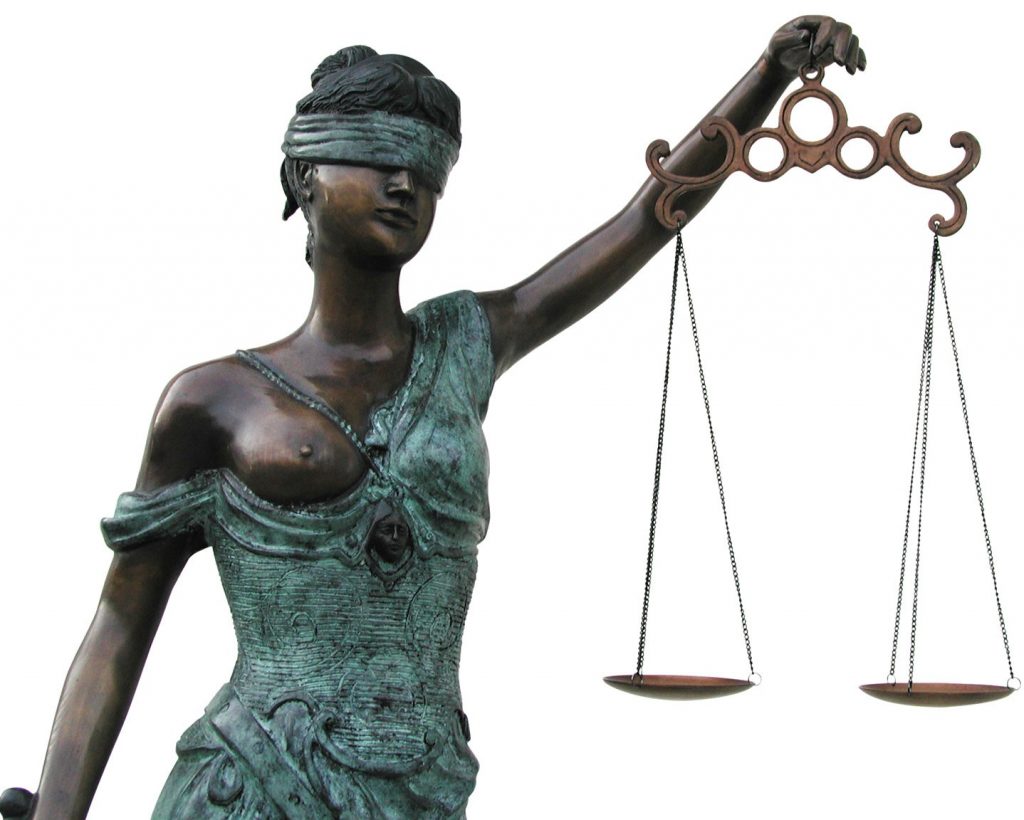“Without regard to persons,” they claim.

By A Contributor
The predominantly Dutch European Judiciary and Public Prosecution Service consistently claim that adjudication and prosecution takes place without regard to persons (‘zonder aanziens des persoon’). However, has the proclaimed blindness of lady justice created a just society, where righteousness is even a sought after ideal? Are we living in the country of St. Martin proudly, united and integrated or conveniently with one foot in and one foot out? Or are we further muddying the water ensuring that greed and corruption prevails, as the system and individuals that partake in the shared state power knowingly or unknowingly partake in sustaining such? Are those the questions being asked by the individuals filling the seats in the last stronghold of the ‘former’ colonial power?
The Public Prosecution Service’s right to investigate and prosecute whomever, vastly at their sole discretion, miraculously heals that blindness. Most recently, an attempt to investigate and prosecute a decision-maker was made based on trumped up norms of among others ‘bringing financial harm to the society’, while it was merely a minister as all previous ministers simply using the power granted to them by law to wield at their discretion. So what was then placed in those scales held by lady justice? Obviously (pun intended) not the law that the actions of the decision-maker were based on. Or, has the principle of the rule of law become a discretionary tool? A just society requires that a reasonable assumption of guilt is sufficiently objective and not based on biases, prejudices, presumptions, assumptions, racial/ethnic profiling and political motives. Especially in this small society where the ethnic and political lines are all too visible, it should be essential to view matters through edifying societal lenses.
Related article: Prosecutor’s Office considering consequences court verdict
Why the concern? Because one can easily recall a case of a former minister together with a partner in crime where no attempt was made to investigate or prosecute either, despite charges being filed against them twice. Never you mind that several of their actions were and are in direct contravention with various laws and that they agreed to do so on black and white. To add insult to injury, the same decision-maker publicly acknowledged breaking the law, then also publicly professed to having called the Public Prosecution Service who in turn declared that there was no pending investigation for his admitted acts! Sadly, those agreements that are largely ‘contra-legem’ (unlawful) and contrary to long established procedures will in the long run cause even greater financial harm to the same society when compared to the actions of the decision-maker that was investigated.
Is the blindness of lady justice so immediate, so shortsighted that it cannot measure the financial impact on the long term? Shouldn’t her blindness be a perpetual one not limited to the terms allocated to individuals as with politicians? Nevertheless, how can one argue not even initiating an investigation after receipt of any one of the complaints, as surely there are more? There’s enough local capacity to process information and enough witnesses with information and evidence to be processed. So what is the problem? Or, are the stories true as with many others? Plugged into the matrix, compromised. Maybe it is time to revisit the ‘we must remain apart from the community’ unspoken rule.
Did Title 28 of the Penal Code make things too simple to prosecute ministers and former ministers that the Public Prosecution Service had to find a work around to be able to sustain those eyes wide shut? To keep their discretionary power intact while establishing ‘new’ norms for when ministers of local origin can wield theirs? Asking for a friend.
Title 28 of the Penal Code as it pertains to ministers can be illustrated as follows: if a law requires that 4 steps are taken to come to a decision by the minister, the minister is obligated to take all four steps. Not one can be skipped. By skipping one, the minister can face prosecution. One would think that such would be easy to do, to prove that a step wasn’t taken especially when a law clearly requires such. However, history is proving the opposite. As it seems to not be about upholding the rule of all law nor about holding our decision-makers accountable to objective and societal relevant established standards but to trump up norms that will ensure the further demise of this fragile society in the long run. Or did you think that an excessive (buitensporig) salary without any relevant formal degree would be a free meal? Start by comparing salaries, the source of wealth and then drill down. Connect the all too visible dots. You can do it Stevie!
At the inception of the Caribbean Court of Justice, I once read something that seemed to be the soundest reasoning for self-realization easily defended any day and any time. The Economic Development Institute in their Information Booklet Series 1, P.W. Jones in the fifth volume (CARIBBEAN COURT OF JUSTICE (CCJ): CARIBBEAN INTEGRATION OR DISINTEGRATION?) explored several questions regarding the Caribbean Court of Justice. The question that caught my attention was:
‘But is it not reasonable to assume that the Judges of the Privy Council being removed from the social environment are likely to be more dispassionate in interpreting and applying the law?’
The resolute response was:
‘Yes! And herein lies the problem!’ Law is not a static corpus of abstract normative principles to be applied mechanistically in order to arrive at objectively valid solutions to resolve problems of human intercourse. Law is the normative outcome of the cut and thrust of human interactions based on collectively determined or generally accepted social values and subject to a process of continuing adjustment to its environment of control. Consequently, persons interpreting and applying the law should be attuned to the relevant dynamics of social interaction, which determine the quality and intensity of human intercourse, and the values conditioning such dynamics. And by this is meant the values that make us cry; the values that make us laugh; the values that make us happy or sad; the values that make us responsible, productive, creative, caring, proud people. In short, the values that condition our uniqueness as a people. In the premises, to be far removed from the immediate environment of social interaction to which the law applies would facilitate a dispassionate analysis of human events and judicially objective decisions but only to the detriment of desirable social behaviour and social cohesion.‘ (Italic and bold mines)
I would hate to think that after reading the above, the conclusion has to be spelled out. Yet I may do so just to be sure in a possible follow up. The question must be though: are the seat fillers and their support network of compatriots preventing the self-realization and by extension the self-determination of the indigenous population? Maybe lady justice fell on her sword due to her blindness and we again didn’t get the memo as yet.
Self-realization is a must as part of the mental, emotional and collective emancipation process, and should be actively sought after. With a plan. If one wants to call it independence, self-determination or a full measure of (internal) self-governance, so be it. However, starting with self-realization leaves room to, before ultimately claiming independence, seek cooperation and collaboration regionally and internationally. To realize those little big steps (systems, language, capacity building, etc.) and bringing them all together in due time. Self-realization surely does not negate accountability and in actuality hinges thereon. That kind of accountability that requires bold decision-making (that bold steps are taken) not for the immediate but for the next 30 to 40 years. Self-realization is realizing that as with the internal operating system of the body we too as a society must have a top notch operating system. That our respiratory track is clear to keep our natural breathing rhythm, that our blood flow is unclothed to strive in every moment, and thought pathways are functioning at its optimum to ever evolve as a nation. In other words, we need mechanisms in place to survive and strive as a collective. Mechanisms that operate outside of any one individual’s will. Near incorruptible, as you can only hold your breath for so long.
Publisher’s Note: Written by a contributor who wishes to remain anonimous for the time being.
###
Related articles:
Prosecutor’s Office considering consequences court verdict
Emmanuel’s “victory” and the difference between criminal and questionable behavior


























